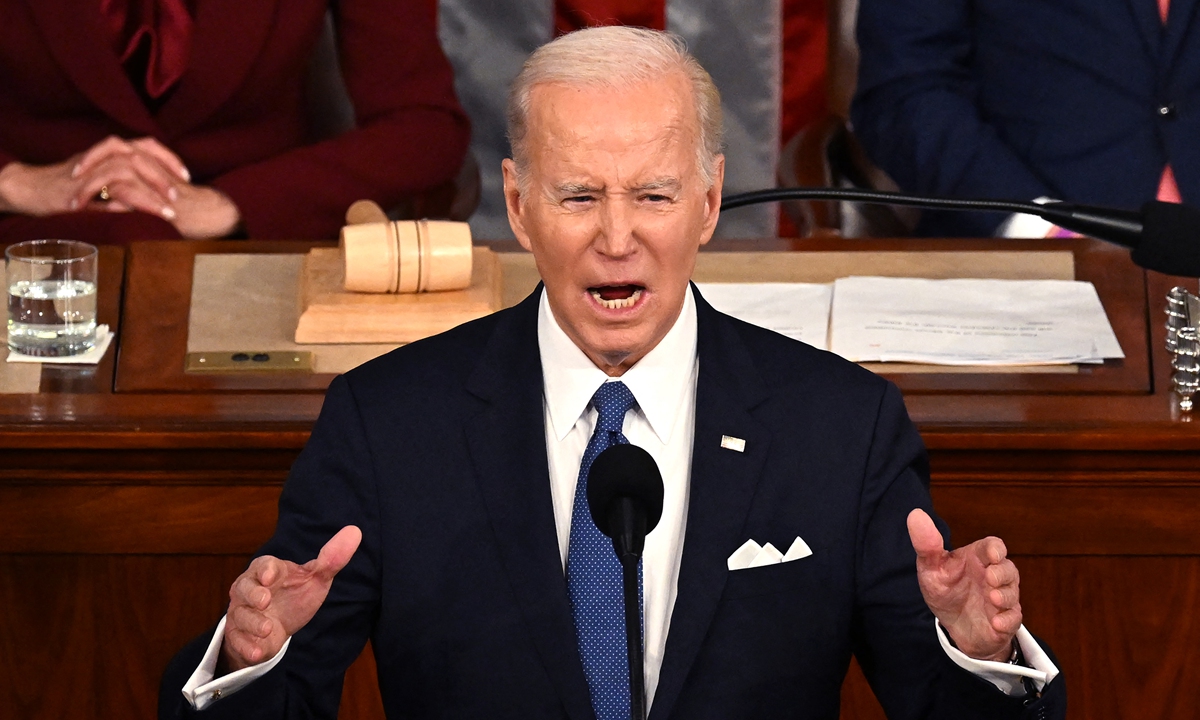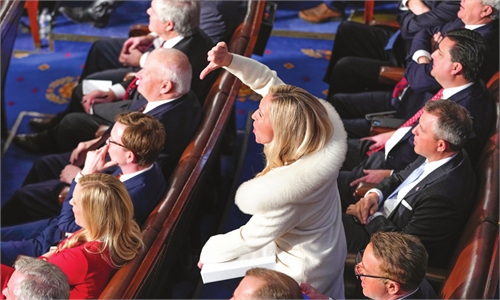State of Union address reflects a US that unsettles world: Global Times editorial

US President Joe Biden delivers the State of the Union address in the House Chamber of the US Capitol in Washington, DC, on February 7, 2023. Photo: AFP
On Tuesday evening local time, US President Joe Biden delivered his second State of the Union address in his term of office at the US Capitol. It is reported that Biden was still writing and revising his speech with advisers until the last moment, which shows the importance he attached to it. The wording and narrative of the repeatedly revised speech are carefully thought out and sound decent, but the address gives people the impression that it doesn't have much fresh and practical content.The evaluation of this speech in the US shows a polarized partisan difference. Some Republican lawmakers even booed Biden during his speech, which vividly indicates that the political division in the country has not been gapped and the "unity" and "healing" sought by Biden has not been achieved. From the State of the Union address and the reaction in the US, we see the same politically divided, sensitive, anxious, and unconfident US. Such a US has made the world uneasy and unsettled.
In US' political agenda, the State of the Union address is equivalent to the president's annual work report to Congress to seek lawmakers' support on domestic and foreign policies. However, the speech has actually become a kind of work report from the US president to the entire US society or even the whole world, focusing on US domestic affairs and major foreign policies. Thus, the State of the Union address is usually regarded as the US presidents' "annual speech for self-praise," and this time is no exception. The State of the Union addresses since the end of the Cold War have charted a clear trajectory that the US has gradually changed from a highly confident, optimistic, and pro-diversity country to today's sensitive, suspicious, and narrow-minded nation. This is regrettable.
At a time when pessimism spreads widely in the US, Biden used many parts of his address to portray the current administration's economic and social achievements over the past year. He tried to convey to lawmakers and voters that "this country is not in decline," but the results didn't meet his expectations. The more Biden emphasizes his country's strength, the more people unconsciously turn their eyes to the vulnerable corners of the US society. A US poll before the speech shows that 62 percent of Americans think Biden has accomplished "not very much" or "little or nothing" in the past two years, while 65 percent believe their country is "on the wrong track." Biden's public approval rating has fallen to only 41 percent, close to the lowest level of his presidency. Americans' confidence in the country's path has hit a record low.
In recent years, the US State of the Union addresses, without exception, all emphasized the extraordinary strength of the country and have paid more and more attention to the issue of "unity." This just reflects what the US lacks the most: the momentum of economic development and the foundation of political unity. Not just Biden. In fact, polls before the State of the Union addresses these years have all shown that US presidents' approval ratings have always been quite low, and "Americans are dissatisfied." The fundamental reason is that the vicious struggle between the two parties has seriously dragged down the country. The US has become increasingly sensitive and radical, only caring about the so-called political correctness and ignoring real national interests.
The occupant of the White House is actually aware of this embarrassing situation, but since the last US government, each administration has prescribed extremely wrong medicines and has retreated sharply toward trade protectionism and unilateralism.
Biden said in his speech, "On my watch, American roads, American bridges, and American highways are going to be made with American products." In addition to the CHIPS and Science Act and the Inflation Reduction Act he mentioned, they are all manifestations of the US' mentality moving from openness to closure. It might find a place in the fierce competition between the two parties, but its damage to the US is long-term. It not only fails to respond to the real needs of the American people, but also makes a superpower that blindly pursues neo-isolationism more dangerous. The international community, including its European allies, has become uneasy about this, and related industries in the US are also under tremendous pressure.
In recent years, as China-US relations have become tense, how the US president mentioned China in the State of the Union address has attracted particular attention from the public. Biden talked about "China" six times in the 2023 address. Some people in the US criticized him for not being tough enough on China, while others praised him for showing restraint and calmness.
In our perspective, "soft" or "tough" is relative. But Biden's speech reflects that he has accepted the wrong perception of China that is popular in Washington and regards China-US relations as a negative-sum game, where "you lose more, and I lose less." Washington is performing self-harm while trying to hurt Beijing.
Although Biden stated that the US seeks "competition, not conflict" with China, it is still not comprehensive to use "competition" to define China-US relations. China has always insisted that the success of both China and the US is an opportunity rather than a challenge to each other, and the vast globe can fully accommodate the development and common prosperity of China and the US. Frankly speaking, in terms of demeanor and breadth of vision, this speech does not look like a State of the Union address made by the president of a major country that considers itself a world leader.

